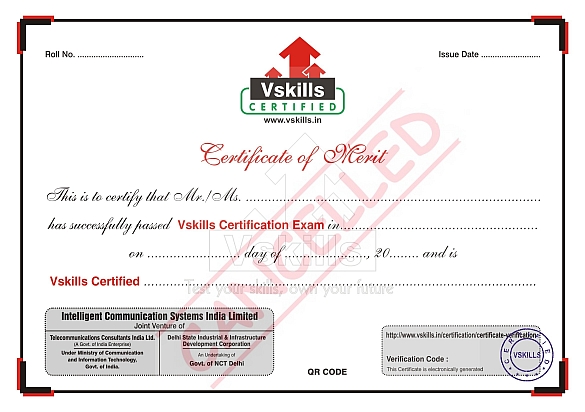- Duration / Course length: 1 To 2 Months Start now
- Certificates:
- Course delivery: This course is delivered in video format
Course details
Vskills Certification in Compensation and benefits assesses the candidate on the principal need of the organization which is establishing and maintaining a pay system which is fair to all. The certification tests the candidates in various areas which include methods to ensure fair and equitable pay, conducting surveys to compare their compensation systems with other companies and ensuring that the firm’s pay scale complies with changing laws and regulations. An important part of the Compensation and benefits manager’s role is performance evaluation. This area also forms the part of the assessment.Why should one take this certification?
If you are working in the HR area and are looking for a new job or promotion or simply more responsibility, then you can take this certification and prove the employer about your knowledge about the area. It works as an added qualification on your CV and significantly improves your chances of getting the desired role.
Who will benefit from taking this certification?
Job seekers looking to find employment in the HR departments of various companies, candidates generally wanting to improve their skill set and make their CV stronger and existing employees looking for a better role can prove their employers the value of their skills through this certification
Table of Contents
Introduction
- Objectives of compensation management
- Principles of compensation formulation
- Types of wages and wage policies
- Procedure and practices for wage determination
- Compensation decisions
- Compensation benchmarking
- Compensation trends and practices in India
- Economic theories in compensation management
- Employee compensation valuation
- ESOPs and its pricing
- Equity in employee benefits
- Labour Markets and Trade Unions
- Job Design
- Job Analysis
- Job Description
- Job Evaluation and Assessment
- Work Measurement
- Management and Ergonomics
- Performance Management System (PMS)
- Objectives and indicator of performance
- Developing performance standards
- Performance modeling techniques
- Performance dimensions and performance observation scales
- Competency-based pay
- Employee evaluation system
- Group incentive plans
- Gain-sharing plan
- Designing team-based compensation
- Issue in rewarding teams
- Theories and practices of executive compensation
- Components and design of executive compensation
- Factors affecting executive compensation
- Executive compensation criteria
- Techniques of performance measurement
- Organizational strategies
- Motivation and morale
- Theories of employee motivation
- Objectives of employee motivation
- Types of employee benefits
- Tax obligations
- Statutory employee benefits in India
- Employee benefits alternatives
- Non-monetary benefits
- Deferred compensation plan
- Sales functions
- Sales compensation plans and issues
- Sales compensation design and administration
- Sales incentives and motivation
- Compensation and Income Tax Act, 1961
- Tax implications
- Wage fixation and legal interpretation
- Variable Compensation plans
- Retirement plans
- Payroll management
- Incentive determination and employee benefits
- Group incentive payments
- Overtime wages
- Economic Value Added (EVA)
- Quantitative analysis
- Approaches to international compensation
- Components of international compensation
- Designing international compensation plans
- Concept of variation
- Cultural issues
- Repatriation issues
- Employees Provident Fund (EPF) Basics
- EPF Features
- EPF Forms
- UAN
- EPF Calculation and example
- Online EPF Submission
- EPFO Claim Status
- ESI Basics
- ESI Registration for Organization
- ESI and Wages
- ESI Contribution
- Online ESI Contribution Submission





